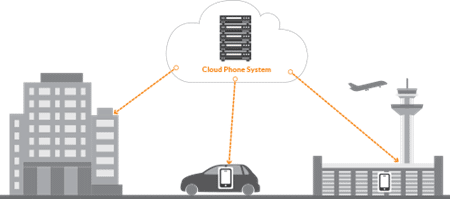
By switching to a cloud system, your company will gain a flexible and cost-efficient solution. A cloud system enables easily adaptable staffing by allowing multiple phone lines to be added with no maintenance or technical staff necessary. Employees enjoy greater flexibility and mobility by having a business phone, and number they can take anywhere, and IT professionals gain complete management visibility and control over the phone services of remote workers. All-inclusive billing eliminates separate landline charges, while having a VoIP service reduces the cost of long-distance calls.
Here are five reasons why a cloud phone system improves remote workforce productivity:
1) Share the same phone system among remote workers and office staff.
Moving your business to the cloud allows you to easily give workers in remote or home offices full-featured business desk phones. Audio conferencing and video web meetings ensure that remote workers feel connected with co-workers and vice versa in better team meetings. The ability to quickly set up audio conferences or web meetings means your staff can collaborate with the right team members at the right time and make better decisions more quickly.
Unlike consumer-grade handsets, these phones instantly integrate with the corporate directory, voicemail, and other key aspects of a business phone system. Even workers who primarily work onsite can use their full-featured VoIP desk phones for part-time home office work or access the same features from their mobile device through the use of a mobile app. Employees will never again have to call clients and customers using their personal number—even when calling from their mobile or home lines—ensuring privacy.
2) Deliver mobility and flexibility.
A cloud phone system breaks down barriers by moving the on-premise PBX phone system out of the building and into the cloud. Workers in the office and remote workers alike share the same features and capabilities of a powerful business phone system—regardless of their physical locations. When employees leave their remote offices, a mobile app allows them to remain connected to the corporate phone system.
Workers can use any device: desk phone, smartphone, or tablet, with a mobile app, or their personal computer with the Softphone application. The desk phone connects to the main business phone system from anywhere simply by plugging it into an Ethernet jack.

A cloud phone system minimizes charges for long-distance calls and eliminates separate landlines. It also provides a monthly invoice that includes all lines for your entire workforce, including remote personnel. That translates into a simplified billing process that not only frees your employees from spending time preparing expense reports but also eliminates the need for managers and corporate accounting to approve numerous phone bills. [To learn more about our all-inclusive billing please reference our plans and pricing guide.]
4) Increase control and viability.
Security is a huge concern within the field of telecommunications and will only continue to be crucial to a company’s ability to function. A cloud-based solution gives IT greater control over security and, where required, meets auditing and compliance requirements such as mandatory call-logging. The comprehensive feature set provided by a cloud phone system enables managers to monitor agent/employee productivity and assess the effectiveness of remote workers, telephone sales representatives, and other key phone-based personnel. And now with RingCentral Reports administrators gain essential insight into how your company utilizes your phone system to enhance business performance.
5) Enable flexible staffing.
Most IT professionals now find themselves responsible for supporting a percentage of employees who spend all or part of their time in a virtual office, or “telecommuting”. With a cloud phone system, you can easily set up remote locations or add telecommuters to support rapid or incremental growth or adapt to seasonal spikes in business. You can also use remote workers to support customers, partners, or co-workers. Support staff can take advantage of features such as call forwarding, which routes calls to their mobile devices when they leave their main locations—so they never miss a call, even while on the go.
These features empower businesses to make their remote workers just as connected as in-office staff, while giving IT complete control over remote employees’ telephone services. Customers are now able to connect with any remote worker as if the employee were sitting in the office.
Conclusion
As the workforce continues to evolve, IT professionals struggle to support the rapidly growing number of virtual workers. A cloud-based business phone system is built from the ground up to do what an on-premise PBX cannot do easily—provide direct connectivity for employees outside of their main locations. These powerful features come in all-inclusive packages that include “extras” such as online faxing, business SMS, audio conferencing, web meetings, and much more—in one simplified bill, for one low monthly fee.
To learn more download our free whitepaper to see how a cloud phone system can uniquely support your mobile workforce today! And check out the infographic to learn more benefits of working remotely.
Originally published Sep 26, 2014, updated Jun 17, 2024




